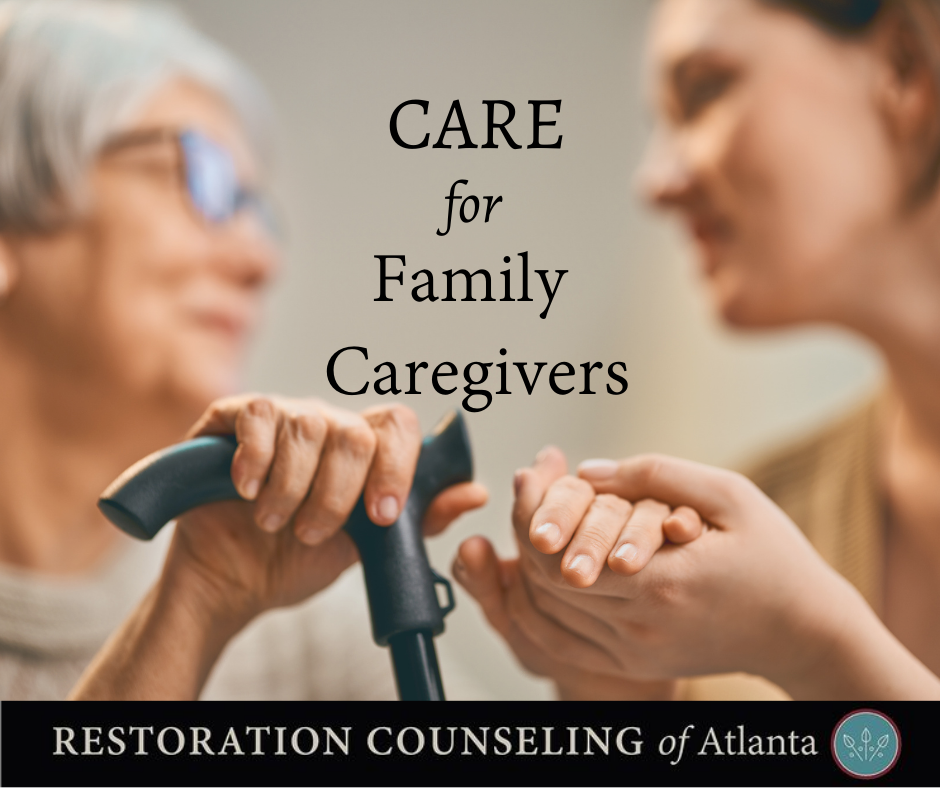“There are only four kinds of people in the world. Those who have been caregivers. Those who are currently caregivers. Those who will be caregivers, and those who will need a caregiver.”
— Rosalynn Carter
Are you a family caregiver or considering becoming a caregiver to a loved one? If so, you are not alone. Shorter hospital stays, medical advances, rising expenses associated with assisted living, and concerns about Covid-19 lead many people to take a more active role in providing care for frail and aging family members. According to the Family Caregiver Alliance (2021), a family caregiver “is a relative, partner, friend or neighbor who has a significant personal relationship with, and provides a broad range of assistance for, an older person or an adult with a chronic or disabling condition.
Today, an estimated 53 million adults in the United States are family caregivers, and more than half take care of the daily living needs of more than one person while also working at a job (AARP, 2021). Depending on the circumstance, providing ongoing care for a family member or loved one can be rewarding. However, caregiving is hard work that is often physically demanding and emotionally taxing. Therefore, it is essential for caregivers to be intentional about paying attention to their own physical, emotional, social, and spiritual health so that they, themselves stay well.
Caring for your Physical Health
“Sometimes asking for help is the most meaningful example of self-reliance.”
— Cory Booker
Caregiving is not a one-person job. It is time-consuming and physically demanding. Often, caregivers need to help their loved one bathe or transfer to a bed or wheelchair. Caregivers may need to lift medical equipment, maintain a home, and provide transport to and from doctor appointments. As a result, many suffer from exhaustion due to inadequate sleep, overworking, and poor nutrition. Some put their own preventative health care on hold because of lack of time or desire to attend another medical appointment.
Sometimes feelings of guilt and thoughts like, “I should be able to handle it,” or fear that, “something will happen if I step away,” arise. This may prevent caregivers from seeking additional help. However, without assistance, the demands of caregiving put caregivers at an increased risk for injury and chronic diseases such as heart attack, diabetes, and cancer. “Using your voice to ask for help, and then accepting it is essential,” says a caregiver who cared for her husband for almost a decade. “The help is out there if you look and ask around.
Caring for yourself is also a means of providing care for your loved one. If you are well, you can focus on making the time together meaningful rather than just surviving.”
Caregiver, seek to care for your physical health by:
- Asking for help -different communities offer different services to caregivers. Seek the assistance of a counselor, social worker, church, senior center, or advocacy group if you don’t know where to turn for help.
- Getting adequate rest. Prioritize getting help during the night if needed. Talk to your doctor about sleep problems and follow doctor’s recommendations
- Ensuring you take time to get even minor health concerns addressed by a doctor
- Prioritizing preventative healthcare: get mammograms, colonoscopies, keep diabetes under control, etc.
- Taking your own medications as prescribed
- Avoid self-medicating with alcohol or non-prescribed medications
- Exercising regularly
- Prioritizing good nutrition -if needed, take advantage of programs like Meals on Wheels, or community food banks
Caring for your Mental Health
You gain strength, courage, and confidence by every experience in which you really stop to look fear in the face. You must do the things which you think you cannot do.”
— Eleanor Roosevelt
Caregiving can have a profound impact on a caregiver’s mental health. According to the Family Caregiving Alliance, between 40% and 70% of caregivers have clinically significant symptoms of depression and are at a high risk for anxiety disorders and substance abuse. Dealing day after day with a person’s basic needs takes a toll on mental well-being. Watching a loved one suffer in pain, decline in ability, or face life-limiting illness is heart-wrenching. Those being cared for are not always pleasant, grateful, or mentally and emotionally present. It is not uncommon for caregivers to feel helpless, inadequate, guilty, resentment, loneliness, anger, jealousy, boredom, fatigue, and fear.
Emotions experienced in caregiving may become even more complicated if there is a history of trauma or past hurts in the relationship between the caregiver and the one being cared for. If the caregiver was abused, neglected, or not loved well by the one they are now caring for, emotional reactions may have a root not only in present challenges but in past trauma. In these cases, seeking help from a counselor who understands how past trauma impacts caregiving can help a caregiver set healthy boundaries and heal emotionally.
To protect mental well-being while caregiving:
- Ask for and accept help
- Attend a support group or regularly share your emotions with an empathetic friend
- Learn about your loved one’s illness and seek support from people who understand the illness
- Participate in an activity that reminds you of who you are apart from caregiving
- Prioritize taking a break. Use respite care or community resources such as a daycare program
- Intentionally relax by doing something you enjoy -take a long bath, do a craft, read a book
- Remember to laugh – intentionally surround yourself with reminders to laugh, watch a comedy video, find moments to be silly
- Find space to cry if needed
- Keep a gratitude journal
- Listen to music that you enjoy
- Learn and practice mindfulness
- Set limits around what you will and will not do.
- Talk to a counselor. A counselor can help you understand and manage complicated or intense emotions, evaluate you for depression, anxiety, or other problems, and recommend treatment to help you begin to feel better.
Caring for your Social Well-being
It is not how much you do, but how much love you put in the doing.”
— Mother Teresa
Caregiving can be a lonely job. Challenges transporting loved ones to social events, feelings of isolation, and tending to the needs of someone often make it difficult for caregivers to socialize. However, social interaction is essential to well-being.
Try to cultivate social well-being by:
- Inviting friends and family over
- Getting help so that you can get out and spend some time with friends sharing coffee or a meal
- Joining an in-person or online support group
- Spending time reading a book with the person you are caring for
- Calling a friend on the phone
Caring for your Spiritual Health
Hebrews 6:10-12.
“For God is not unjust. He will not forget how hard you have worked for him and how you have shown your love to him by caring for other believers, as you still do. Our great desire is that you will keep on loving others as long as life lasts, in order to make certain that what you hope for will come true. Then you will not become spiritually dull and indifferent. Instead, you will follow the example of those who are going to inherit God’s promises because of their faith and endurance.”
A family caregiver can be encouraged and strengthened by his or her faith in God. However, the act of caregiving can be spiritually challenging. Watching a loved one become frail, experience functional loss or death can challenge a caregiver’s understanding of God’s goodness. It may even cause feelings of anger toward God. Just as it is important to care for physical, mental health, and social well-being, it is essential to stay intentional about caring for spiritual health.
Try these practices to care for your spiritual health:
- Praying
- Reading scripture
- Journaling
- Asking for help when you need it so that you can attend worship services
- Attending an in-person or online Bible study
- Calling a pastor to answer questions about spiritual uncertainties
- Requesting visits and/or communion from clergy
- Meditating on God’s promises
If you are a family caregiver, providing care for your family member includes being intentional about caring for yourself. If you are a caregiver and you feel too tired, depressed, or overwhelmed by the thought of taking these steps to care for yourself, please call a counselor. We can provide you support, connect you with resources, help you navigate a path to wellness, and care for you as you care for others.
Helpful Resources and Article References
AARP -American Association of Retired Persons – Dedicated to helping people live well as they age.
Alzheimers.gov Providing support for Alzheimer’s patients and their families
Caregiver.com – Online resource and community dedicated to supporting the caregiver and those they care for
National Alliance for Caregiving
Memory Care Guide – A guide covering memory care costs in Georgia, financial assistance options, free memory care resources in the state, and a directory of memory care facilities in Georgia.
 Written by Andrea Brandt, NCC, APC
Written by Andrea Brandt, NCC, APC
andrea@restorationcounselingatl.com, ext. 154
Roswell Location
Andrea received a Master of Arts degree in Clinical Mental Health Counseling from Richmont Graduate University, a Christ-centered university, and currently serves clients in Georgia as an Associate Professional Counselor under supervision and direction. She has continuing education and experience working with addiction and family-related issues and applying cognitive-behavioral therapy (CBT), Exposure and Response Prevention (ERP) for OCD, and Telemental health.

